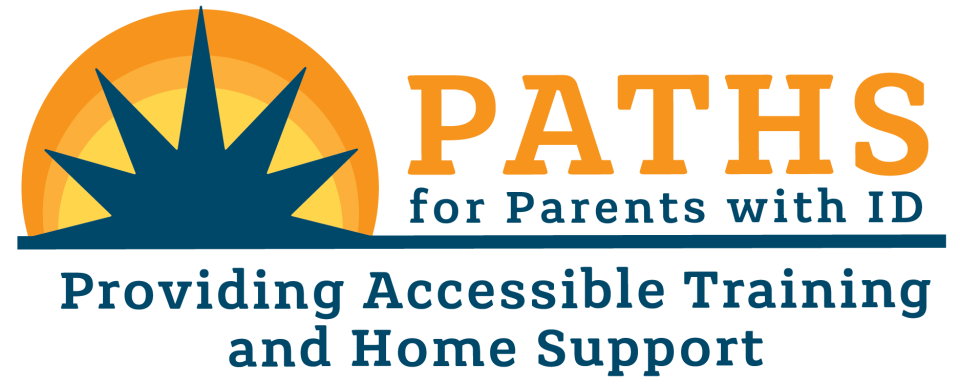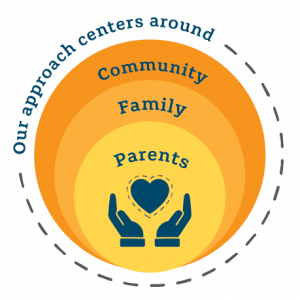PATHS
For Parents with Intellectual Disabilities (ID)
We are collaborating with Arizona home-visiting programs to improve access to high-quality parenting support for parents with intellectual disabilities.
4.1 million parents in the U. S. have disabilities (Li, Parish, Mitra & Nicholson, 2017).
Our focus is on supporting parents with intellectual disabilities who have children up to 5 years old.


Through this project, the IHD team will…
- Gather information about the evidence-based home-visiting programs currently utilized with Arizona families
- Collaborate with an advisory group to develop materials designed to enhance home-visiting services for parents with intellectual disabilities
- Design and provide training to Arizona home-visiting professionals on the utilization of the enhancement materials
Introduction to Intellectual Disability and Home Visiting
In it’s first year, PATHS hosted a series of educational seminars for home visitors and other community health workers. We have covered what Intellectual Disability (ID) is, common myths and challenges surrounding parenting with ID, and implications for home visitors serving parents with ID. Find the video recordings and slideshows in the “More Information” section below under the “PATHS Presentations” tab.
More Information
-
Resources Tab Open
-
Handouts Tab Closed
-
PATHS Presentations Tab Closed
-
Glossary Tab Closed
-
Project Status Update Tab Closed
Resources Accordion Open
The School of Social Work, Arizona State University
Supporting Parents with Disabilities – A User-friendly Guide for Social Service Providers
Training 1: Awareness and Basic Knowledge of ID
- Spread the Word
- Plain language guidelines
- Person-first language (NIH)
- Advice for Professionals Working with Parents with Intellectual Disabilities (Brandeis)
- Nothing About Us Without Us
- AZ Law 36-551.01
- Map of State Termination of Parental Rights Laws that Include Parental Disability (Brandeis)
- Revised Statute:Termination of Parental Rights
Training 2: Individualization of Care
Training 3: Tools and Resources
PATHS Presentations Accordion Closed
Video of recording of Session 1. Awareness and Basic Knowledge – October 1, 2024
PowerPoint Slides for Session 1. Awareness and Basic Knowledge – coming soon
Video of recording of Session 2. Individualization of Care – October 15, 2024
PowerPoint Slides for Session 2. Individualization of Care – coming soon
Video of recording of Session 3. Tools & Resources – October 29, 2024
PowerPoint Slides for Session 3. Tools and Resources – coming soon
Video of recording of Session 1. Awareness and Basic Knowledge – April 22, 2024
PowerPoint Slides for Session 1. Awareness and Basic Knowledge – April 22, 2024
Video of recording of Session 2. Individualization of Care – May 6, 2024
PowerPoint Slides for Session 2. Individualization of Care- May 6, 2024
Video of recording of Session 3. Tools and Resources – May 20, 2024
PowerPoint Slides for Session 3. Tools and Resources – May 20, 2024
Glossary Accordion Closed
- ID: Intellectual disability
- Home visiting: Home visitors provide assistance and guidance in various forms to parents with young children.
- Plain language: used to describe an idea in the simplest terms possible
- Universal design: The principle of designing a product to be accessible to all regardless of disability status or other factors
- ECHO model: Extension for Community Healthcare Outcomes (ECHO) modeled training sessions involve a didactic portion intended to verbally teach content to the audience, as well as a case study portion of real anonymized stories intended to invoke thought and discussion among attendees.
Project Status Update Accordion Closed
In the 2023-2024 project year, we:
- Conducted 13 interviews with home visitors working in the state of Arizona
- Designed and hosted a series of three virtual training sessions for service providers of parents with intellectual disabilities
- Presented our results at the 2024 IHD Evidence for Success Disability Conference and collaborated with other ADDPC-funded parenting projects to assemble a new conference strand, “Parents with Disabilities”
ECHO Model Accordion Closed
The Institute of Human Development will use the Extension of Community Health Outcomes (ECHO) model to provide free continuing education using an instructional and case study reflection approach through video conferencing.
Project ECHO: Are you part of the ECHO?

For more information, contact Dr. Sara Clancey at Sara.Clancey@nau.edu.
Or contact us at paths.az@gmail.com
